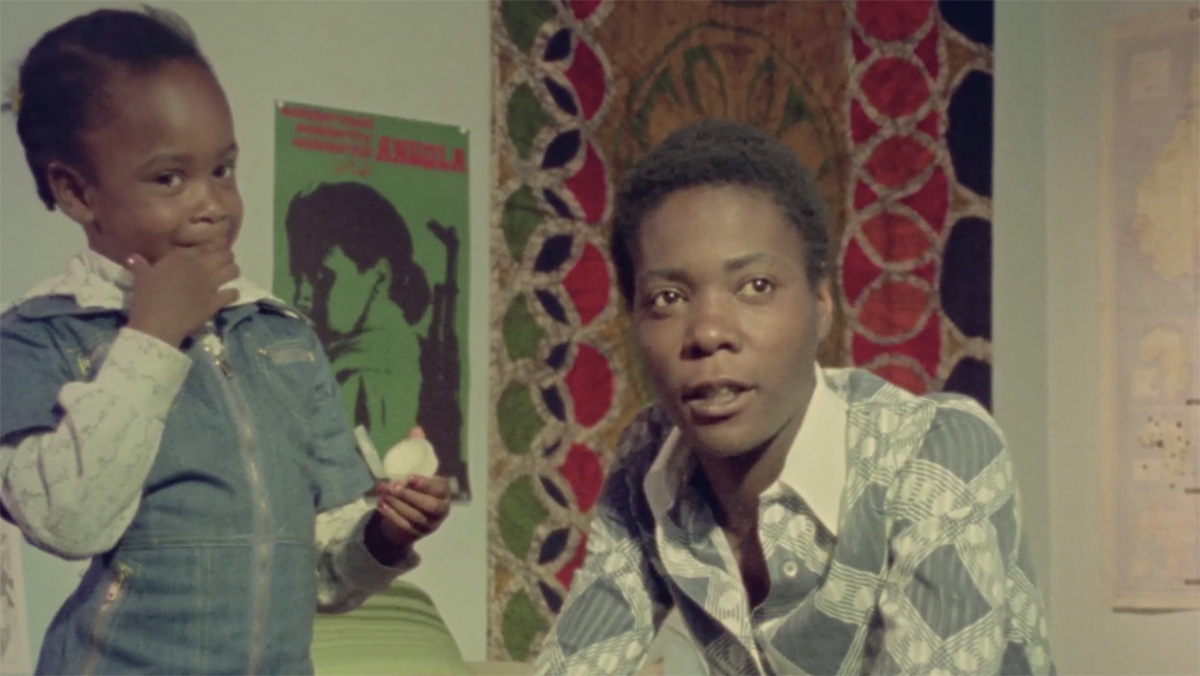Documentary captures humanity, resilience of LGBTQ+ motherhood experience

Two subjects speak in the 1977 documentary “In the Best Interests of the Children.” (Courtesy of Women Make Movies)
"In the Best Interests of the Children"
Oct. 28 at 4 p.m.
Online
Free
By Paula Preda
Oct. 27, 2021 11:30 p.m.
“In the Best Interests of the Children” transports viewers to the ’70s for a history lesson on queer parenthood.
On Thursday, the UCLA Film & Television Archive will host a virtual screening of the 1977 documentary film co-directed by Elizabeth Stevens, Cathy Zheutlin and Frances Reid, followed by a prerecorded Q&A with Reid and Senior Programmer at Film Independent, Jenn Wilson. Produced at a time when many lesbian mothers coming out of heterosexual relationships were losing custody of their children, the film was made to educate the public and the judicial system about the humanity of these family dynamics, Reid said.
“We wanted to make a film that was a propaganda film practically,” Reid said. “(A film) that really showed healthy, happy lesbian families just doing really normal things that were no different than straight families.”
Before creating the film, Reid said her partner had recently lost custody of her children after having very little agency in court to contest the separation. This contributed to the film’s focus of shedding light on the humanity of lesbian motherhood through observational documenting and interviews, she said. Film programmer at The Archive K. J. Relth-Miller said the film was a way to give ample screen time and respect to the children of these mothers and their nuanced experiences while discussing their time in court.
“(The film) is this mix of the interviews with the mothers, legal experts and the children who are involved in these cases and some of these relationships,” Relth-Miller said. “And then, it’s intercut with these really lovely vérité moments of watching families interact with each other.”
[Related: Holiday pays homage to silent films, sheds light on impact of genre]
Despite others’ doubts regarding the probability of finding people willing to speak out about their experiences, Reid said she found that many women were thrilled to share their stories and pave the way for other lesbian mothers to enter the dialogue. Driving across the country with Stevens to host viewings, the director said she was very happy to have something that made her feel visible as a queer person and made the women at the screenings feel represented.
While the film focuses on the lesbian experience, it also includes racially and socioeconomically diverse perspectives in its study of family dynamics, Relth-Miller said. By depicting Black, working-class and college-educated mothers, the film looks at motherhood from various angles instead of the white middle-class perspectives that were central to second-wave feminism, Relth-Miller said.
Viewing the film from the perspective of the 21st century, Relth-Miller said she hopes the audience can contrast it with the present. Reid said she wants the film to come across as archaic in the way that the scenarios depicted are not the conditions of today but are still valuable for understanding the history of the struggles of queer people. Although struggles still exist for the LGBTQ+ community, she said the denial of services or religious objections to queerness is now the anomaly as opposed to being the accepted norm.
[Related: UCLA Film & Television Archive to host virtual screening of “The War Widow”]
The Archive’s restoration and preservation of the film was a collaborative effort with the Outfest UCLA Legacy Project for LGBTQ+ moving image preservation and is one of four films recently scanned for screening. With the help of the Andrew J. Kuehn Jr. Foundation, The Archive has gotten the opportunity to showcase materials that have not seen the light of day for years, Relth-Miller said.
To make this collaboration possible, Brendan Lucas, project manager for the Outfest UCLA Legacy Project, said Outfest’s relationship with UCLA grew out of a shared interest between the queer and archival communities for the restoration of queer films. He said there was a need for LGBTQ+ specific preservations so that queer stories could be seen in the way they were intended across generations.
Beyond the live event, Women Make Movies, an organization that has supported showings of the film for decades, will allow access to the screening for two weeks following Thursday. Relth-Miller said the message in the film is still relevant today, and anyone who tunes in might be intrigued by the methods of making an extremely personal, but informative, portrait of LGBTQ+ history.
“We really hope that bringing (Reid) back into dialogue with her work from over 40 years ago will illuminate not just the plight and the joy of the lesbian mother and the legal complications that were involved in the 1970s, but it will also bring it to the present moment,” Relth-Miller said.


